Pollution and climate change fueled by disposable plastics is a scourge of modern times — but recent research suggests a few simple changes can push people to use fewer single-use plastic utensils.
Writing in the journal Science, Chinese researchers report on how incorporating “green nudges” into a popular Chinese online food delivery service dramatically cut single-use cutlery orders. The nudges, if applied at a larger scale, could cut both plastic waste and deforestation, the scientists say. paper bowl

China is the world’s largest producer and user of single-use cutlery, with Chinese customers of food delivery services using more than 50 million sets of single-use cutlery each day that were not “adequately recycled or disposed of,” the researchers write.
In response to new regulations designed to quell disposable cutlery waste, the Chinese online food platform Ele.me — similar to UberEats or DoorDash in the United States — began asking consumers whether they wanted cutlery with their orders, instead of automatically including it.
The researchers worked with Ele.me’s parent company, Alibaba, to evaluate the effectiveness of this initiative, which defaulted to zero cutlery and also allowed users to earn points that could be collected and redeemed for planting a tree in the Chinese desert.
They found that no-cutlery orders increased “significantly” — 648 percent — after the app change. The “nudges” didn’t harm business performance or the total number of orders.
Different groups responded differently to the app’s cutlery choices. Women, people over age 24 and infrequent app users were more likely to respond to the nudges, while people with more expensive cellphones or who bought more expensive meals responded more often.
Over 27 months of study, the researchers write, the nudges cut the number of cutlery sets delivered by 225.33 million, preventing 4,506.52 metric tons of waste and saving the equivalent of 56,333 trees.
If applied nationwide, the researchers write, such changes could make a massive difference.

Plastic Cutlery “We think that the private sector and platform companies can play a powerful role in promoting prosocial behaviors among their customers,” the researchers write. “Better alignment between their corporate social responsibilities and ecofriendly initiatives could bring about far-reaching impacts to our planet.”